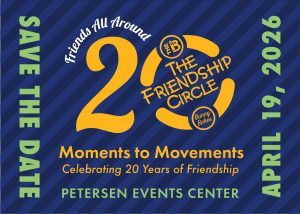
Art by Rivka Korf Studio
A WEEKLY TORAH THOUGHT FROM RABBI MORDY
This week’s Parsha contains lots of moving parts. Joseph is reunited with his brothers and then his father and there is lots of drama associated with their reunion. Joseph sends his brothers back and forth to their father in Israel, frames them by planting his goblet in one of their sacks then accusing them of stealing it, takes one captive, etc. There was lots of drama to be sure; was Joseph showing them a bit of what it was like to go through the life he did? (I’m joking; Joseph did not bear any resentment and ultimately told them he knew he was meant to be in Egypt because his whole life was according to “Divine Plan.”) Then, after all is said and done and they are reunited, Joseph introduces himself to his one full brother Benjamin. This reunion was packed with emotion, culminating with Joseph and Benjamin crying on each other’s shoulders. Certainly this is normal behavior, considering how much time had passed, how Joseph wasn’t able to be there for his younger brother, etc. And yet, we are told there was more to their crying than personal feelings. They actually had a degree of holy foresight; they “saw” that the two Temples would be built in Jerusalem on Benjamin’s land, and the Sanctuary in Shiloh would one day built (and then destroyed) on Joseph’s land. Many interpret that Joseph was crying with the Temples in mind (on Benjamin’s land) and Benjamin was crying with the Sanctuary in mind (on Joseph’s land). But why? Why did their foresight not cause them to cry for their own future “bad news?” Why do they do so for the other’s? I saw something interesting that is especially applicable today. This episode teaches us that there is only so much we can do for our fellow man. We should try to do our utmost but ultimately, it is up to that person to heal, to fix, to correct or to thrive. Not so for ourselves. When it comes to our own trials and tribulations, we do not have the luxury to stop trying. We need to make moves. We need to act. We need to strive tirelessly to get ourselves out of the rut we are in. For our friend? If they can’t seem to get out of it, we should feel for them, cry even, as there is only so much we can do. But for ourselves, we must never ever give up. In the Jewish community, times are certainly tough. The last few months have been challenging in Israel and around the world , and the last couple weeks have been especially tragic in our own community with several untimely passings. But we cannot sit and mope about, rather we need to dust ourselves off and move forward with hope and optimism. We have encountered difficult times before, but know that we’re able to act, even more so in the merit of those we have lost. May we all strive to bring more goodness and kindness into the world—it needs it now more than ever. Good Shabbos!






